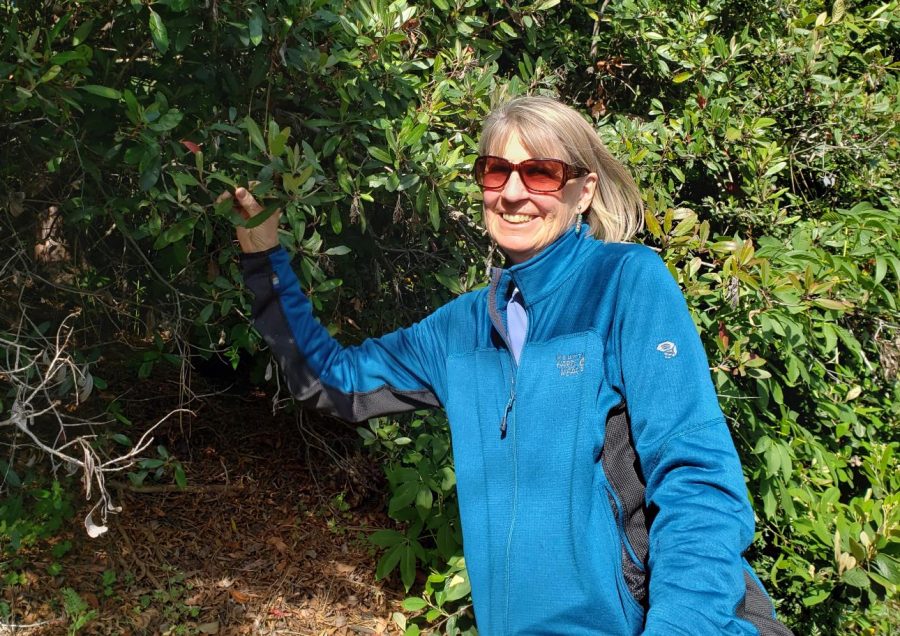Professor explores nature
Daniel Hernandez / The Advocate
Biological sciences professor Pamela Muick, who leads her BioSci 110L class on hikes, stands next to a holly tree as she observes the diverse ecosystem offered on the Contra Costa College campus.
May 15, 2019
Over the past decade she’s taught biological science at Contra Costa College, and through a lifetime of experience outdoors, professor Pamela Muick has used hiking to teach her students outside of the classroom.
At least once every semester students in her Biological Sciences 110L class are treated to an outdoor class, a hike, to better understand their surrounding environment and each other.
Her deep interest stems from when she was a child. Living in the Midwest in her youth, she was exposed to the outside world, whether it was gardening with her grandmother or hunting with her father and grandfather.
Even as Girl Scout, she absorbed the skills and knowledge for camping and exploring nature.
“Hiking is very relaxing,” Muick said. “You never know what you’re going to see.”
Her fascination with the outdoors continued as she got older and moved to California, going on backpacking excursions with her friends.
One of her most memorable experiences hiking was back in the early ’80s where she led a youth conservation group of high school students in Ketchikan, Alaska.
“We ended up walking a stream that was full of salmon that were going to spawn. We were in water up to our knees.” Muick said. She called it a primitive experience, making judgments with their instincts.
With her Biology 110L class, she’s taken them out to places such as Point Pinole and Wildcat Canyon regional parks to enrich their learning experiences for the past 12 years she’s been teaching at CCC.
“It’s a fantastic bonding experience because we’re walking three or four miles and (students) are talking with each another so they get a chance to see different aspects of one another,” Muick said.
Her method of teaching the class outdoors includes traveling to different locations around the park and encouraging students to silently observe the environment around them using each of their senses.
Denny Khamphanthong, a student in her class this semester, said, “From what I remember, the experience was pretty good. I go out to Point Pinole a lot so it was nice getting the perspective of a biologist like Pam.”
The concept is that with 40 different pairs of eyes and each mind having its own outlook, an individual will be able to notice characteristics of the environment that others don’t notice, and share it with the rest.
“When I did the hike it was very abstract at a certain points,” Khamphanthong said.
The goal is to learn about the local ecosystem. Having fresh eyes supplements one’s knowledge about ecosystem structure and how organisms relate to one another.
“Almost everybody who says they go to Point Pinole regularly say they’ve never seen these things before or they’ve never observed them before,” Muick said. One thing she enjoys seeing is the
Great Horned Owls that come out at twilight, a rare opportunity that only comes at a certain time of day.
“Attention can be very random,” biology student Fernando Moratinos said. “The field trip made me realized how important it is to have somebody who can point us in the right direction to fully experience the life activity that is happening around us.”
Along these excursions, classmates get the opportunity to observe their peers in a setting other than the classroom. Sometimes students create new relationships with each other during the trip.
When she’s not teaching at CCC, Muick teaches environmental science classes at Solano Community College in Fairfield. She is also a docent to the Solano Land Trust, volunteering her time to giving tours of Solano County parks.



